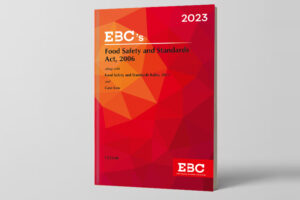Gauhati High Court: While deliberating over the alleged violation of the fundamental rights when the petitioners’ livelihood was threatened after a Government Order issued by the Chief Secretary of the Nagaland Government, banned the commercial import, trading of dogs and dog markets as well as commercial sale of dog meat in markets; the bench of Marali Vankung, J.*, quashed the impugned order on the ground that Chief Secretary was not the appropriate authority to issue the impugned order dated 04-07-2020 when Section 30 of the Food Safety and Standards Act, 2006 provides for appointment of a Commissioner of Food Safety for the State for an efficient implementation of food safety and standards and other requirements laid down under the Act.
Background: Food Safety and Standards Authority of India (FSSAI) had issued the circular dated 06-08-2014, stating that the Regulation 2.5 of the FSS Regulation, 2011 has defined animals, carcass and meat wherein sub-regulation 2.5.1(a) has defined “animal”. The slaughtering of animals of any other species other than the one listed in sub regulation 2.5.1(a) is not permissible under the FSS Act, 2006 and Regulation, 2011. Pursuance to this circular, the impugned order of ban was issued. Regulation 2.5.1(a) of FSS Regulation, defines ‘animal’ which includes- Ovines; Caprines; Suillines; Bovines; and poultry and fish.
The impugned notification dated 04-07-2020 was then notified, which stated that the slaughtering of any other species other than the ones listed in sub-Regulation 2.5.1(a) of the 2011 Regulation is not permissible under the FSS Act and Regulation. The notification stated that in order to regulate the safety of food articles safe for human consumption, ban on slaughtering and sale of dog meat in the State of Nagaland is necessary. Thus, under the provisions of FSS Act and Regulation, the commercial import and trading of dog and dogs’ market and commercial sale of dog meat in markets and dine-in restaurants were. Violation of the ban order would attract liability under Sections 428 & 429 of the Penal Code, 1860 and Section 11 of the Prevention of Cruelty to Animals Act, 1960.
Contentions-
Petitioners: The counsels for the petitioners submitted that FSS Regulation, 2011 has not expressly or impliedly prohibited slaughter of any specific animals not mentioned in regulation 2.5.1(a) for human consumption. Likewise, the Food Safety and Standards Act, 2006 has also not prohibited the slaughter of animals not mentioned in regulation 2.5.1(a). It was argued that the respondents have wrongly interpreted the provisions.
The petitioners further submitted that it is the culture and custom of the Nagas to eat dog’s meat which has been mentioned in some to the earliest ethnographical and anthropological accounts of the Nagas. The same has been practiced since long which is duly published and should be taken notice of by the Court. It was further submitted that dog’s meat is consumed widely in Kohima and the right of the petitioners and their customers to eat dog’s meat, forms a part of their right to privacy.
It was contended that FSS Act, 2006, gives an elaborate definition of “food” under Section 3(j) and “substance” under section 3(zw). The petitioners stated that the meaning of food under the FSS Act, 2006 would mean any substance which is intent for human consumption and would mean a solid natural substance which is the meat of any animal, which is not prohibited to be killed for human consumption by any law for the time being in force, thus, dog meat falls under the definition of food as specified in the FSS Act, 2006. It was further argued that neither the FSS Act, 2006 nor the FSS Regulation, 2011, specify that animals not included in the definition of ‘animal’ under regulation 2.5.1(a) of the Regulation, 2011 are prohibited from being slaughtered for human consumption. Non-inclusion of dogs or any other animal under the regulation does not mean that the consumption of dog meat has been prohibited by the Regulation.
The petitioners also stated that the Food Authority of India is not empowered to narrow the scope of the FSS Act, 2006 and the Food Authority has not been given the authority to issue any prohibition order banning the consumption of dog meat under the FSS Act or the FSS Regulation, 2011. The impugned order dated 04.07.2020 has no legal backing and is in violation of the fundamental rights of the petitioner as enshrined under Articles 19 and 21 of the Constitution. The petitioners are being denied the right to consume the food of their choice and to earn their livelihood when import /export permit dated 03.06.2020 has been issued by the Kohima Municipal council for the petitioner to trade in dog meat.
Respondents:Per contra, the respondents submitted that the impugned order is verbatim replication of Regulation 2.5 of the FSS Regulation, 2011 and therefore, not an interpretation of the regulation as claimed by the petitioners.
The respondents argued that the petitioners have not placed on record any licenses/registration for functioning as Food Business Operators under the FSS Act, 2006. Mere temporary trade licenses from the Municipal Corporations do not mean that the petitioners are permitted to carry out food business in meat trade, let alone dog meat trade. Furthermore, the temporary Import/Export Permit issued by the Kohima Municipal Council, permitting the petitioners to import dogs from all over India, has been wrongly issued as dog meat trade is not permissible all over India.
The respondents submitted that Chief Secretary has a constitutional duty under Article 256 of the Constitution to ensure the public safety and the well- being of the citizens and has the full authority to issue the impugned notification since the consumption of dog’s meat is against the interest of health of the people.
Issue for Consideration: Whether the Food Safety and Standards Authority of India had acted beyond its delegated powers by issuing the circular dated 06.08.2014, regarding definition of ‘animal’. The slaughtering of animals of any other species other than the one listed in sub regulation 2.5.1(a) is not permissible under the FSS Act, 2006 and Regulation, 2011 and whether in pursuance of the circular the State of Nagaland had rightly issued the impugned order, banning the commercial import, trading of dogs and dog markets as well as commercial sale of dog meat in markets and dine in restaurants.
Court’s Assessment: Perusing the contentions issue and FSS Act, 2006 and Regulations 2011, in detail, the Court stated the following-
- The Court pointed out that under the definition of ‘animals’, under Regulation 2.5.1(a) of FSS Regulation, 2011, canines or dogs have not been mentioned, since the meat of dogs is consumed only in some parts of the North-Eastern states and the very idea of consuming dog meat is alien in other parts of the country. The Court also took note of the facts that dog meat appears to be an accepted norm and food amongst the Nagas even in modern times, wherein the petitioners are able to earn their livelihood by transporting dogs and selling of dog meat. “But, dog meat is not considered the standard of food for human consumption and excluded in the definition of animals safe for human consumption”.
- The Court pointed out that Sections 33 and 34 of FSS Act, 2006 provide for certain circumstance under which prohibition notices/orders can be passed which are however not prohibiting the slaughter of any other animal for human consumption not mentioned in Regulation 2.5.1(a). the Court also noted that Food Safety and Standards Authority of India was delegated the power to ensure availability of safe and wholesome food for human consumption by make regulations consistent with the Act.
- Upon perusal of Section 16 of the FSS Act, which deals with “Duties and Functions” of the Food Authority, the Court noted that there is no mention of power to issue prohibition orders by Food Safety and Standards Authority. Thus, it seems that the Food Safety and Standards Authority of India have acted beyond its duties and functions.
- The Court noted that State has already appointed a Commissioner of Food Safety for the State, to implement the provisions of the FSS Act within the State; however, the impugned order was issued by the Chief Secretary. Relying on Marathwada University v. Seshrao Balwant Rao Chavan, (1989) 3 SCC 132, wherein it was held that “when the Act prescribes a particular body to exercise a power, it must be exercised only by that body. It cannot be exercised by others unless it is delegated”; the Court held that Chief Secretary was not the appropriate authority to issue the impugned ban order.
- The Court was of the view that even if the petitioners were not maintaining standard sanitation facilities for slaughtering of dogs, the same could have been rectified via remedial measures. There was no requirement to impose a ban on commercial trade of dogs and dog meat.
-
The Court thus set aside the impugned order pointing out that it has affected the livelihood of the petitioners. The prohibition of sale and consumption of dog meat, by the Executive branch of the Government, without there being any law passed by the legislature in relation to trade and consumption of dog meat is liable thus to be set aside, even though it was passed in accordance with a Cabinet decision.
[Neizevolie Kuotsu v. State of Nagaland, 2023 SCC OnLine Gau 2070, decided on 02-06-2023]
*Judgment delivered by Justice Marali Vankung
Advocates who appeared in this case :
Petitioners- L. Iralu, Adv;
Respondents- Government Advocate; Shrieya Poropkarie, for respondents Nos. 6 & 7; V Suokhrie, Addl. Advocate General for the State respondents Nos. 1 & 2 and Ms. Limanaro, for respondents Nos. 4 & 5.
Buy Food Safety and Standards Act, 2006 HERE







